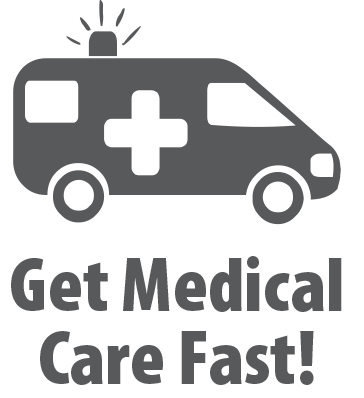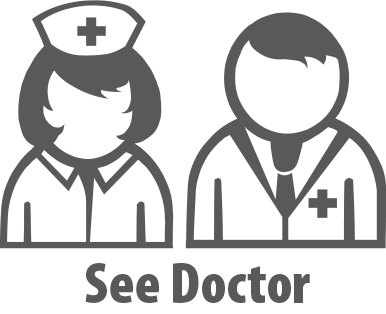Eye Conditions
Glaucoma
Glaucoma is a group of eye diseases that damages the optic nerve and causes vision loss.
Signs & Symptoms
For Chronic (Open-Angle) Glaucoma
This type takes place gradually, and causes no symptoms early on. Loss of side (peripheral) vision and blurred vision are the first signs.
Later, symptoms include:
• Vision loss in side and central vision, usually in both eyes.
• Blind spots. Seeing halos around lights.
• Poor night vision.
• Blindness, if not treated early.
For Acute (Angle-Closure) Glaucoma
This type is a medical emergency! These symptoms occur suddenly:
• Severe eye pain and nausea.
• Blurred vision. Seeing halos around lights.
• Redness in the eye. Swollen upper eyelid.
• Severe headache that throbs.
Causes
Glaucoma occurs when the pressure of the liquid in the eye gets too high and causes damage to the optic nerve. Increased eye pressure without damage is not glaucoma, but increases the risk for it. Antihistamines and long-term corticosteroid use can trigger or worsen glaucoma.
Risk Factors for Glaucoma
• Being over age 60, especially Mexican Americans.
• Being African American over age 40.
• Having a family history of glaucoma.
• Having diabetes.
• Being nearsighted.
Treatment
Treatments help with current vision. They do not improve sight already lost from glaucoma. Glaucoma may not be preventable, but the blindness that could result from it is. Get tested for glaucoma when you get regular vision exams. If pressure inside the eyeball is high, an eye doctor will prescribe treatment. This includes:
Medicines used for acute glaucoma are prescribed for life. If medicines do not control the pressure, your doctor may advise:
• Laser beam surgery.
• Surgery that drains fluid from the eye.
• Medicines. These are the most common early form of treatment.
– Prescribed eye drops or pills lower eye pressure, cause the eye to make less fluid, or help drain fluid from the eye.
– Take medicines on a regular basis.
– Let your eye doctor know of side effects.
Questions to Ask
Question
01
Do you have signs and symptoms of acute glaucoma listed on this page?

Get medical care without delay. If symptoms are life threatening go to the ER or call 9-1-1. Don’t call 9-1-1 or use the ER if symptoms do not threaten life. Ask your doctor ahead of time where you should go for a problem that needs prompt care, but not emergency care.
x
Question
02
Do you have any signs and symptoms of chronic glaucoma listed on this page?

You should be seen by your doctor for medical advice. Contact your doctor or health care provider to find out how soon you should be seen.
x
Self-Care / Prevention
• Don’t smoke. If you smoke, quit.
• Do not take any medicine, including over-the-counter ones, without first checking with your doctor or pharmacist. Most cold medications and sleeping pills, for example, can cause the pupil in the eye to dilate. This can lead to increased eye pressure.
• If prescribed eye drops for glaucoma, use them as directed.
• Ask your eye doctor about low vision services and devices.
• Try not to get upset and fatigued. These can increase pressure in the eye.
Resources
National Eye Institute (NEI)

Download an offline pdf file.
2021 © American Institute for Preventive Medicine - All Rights Reserved. Disclaimer | www.HealthyLife.com








